- Home
- W. Somerset Maugham
Ten Novels and Their Authors Page 13
Ten Novels and Their Authors Read online
Page 13
Since money played so large a part in Balzac’s existence, it is worth while to consider what these sums really amounted to. Fifty thousand francs was two thousand pounds, but two thousand pounds then was worth far, far more than it is worth now. It is difficult to say how much. Perhaps the best way is to state what at that time could be done on a certain number of francs. The Rastignacs were gentry. The family, consisting of six persons, lived in the provinces, thriftily, but according to their station with decency, on three thousand francs a year. When they sent their eldest son, Eugène, to Paris to study law, he took a room in the pension of Madame Vauquer and paid forty-five francs a month for board and lodging. Several young men had rooms out, but came in for their meals, since the house had a reputation for good food, and for this they paid thirty francs a month. Board and lodging to-day in an establishment of the same class as Madame Vauquer’s would cost at least thirty-five thousand francs a month. The fifty thousand francs that Balzac’s mother paid to save him from bankruptcy would be equivalent now to a very considerable sum.
The experience, though disastrous, provided him with a good deal of special information and a knowledge of business which were useful to him in the novels he afterwards wrote.
After the crash, Balzac went to stay with friends in Brittany, and there found the material for a novel, Les Chouans, which was his first serious work, and the first which he signed with his own name. He was thirty. From then on, he wrote with frenzied industry till his death twenty-one years later. The number of his works is astounding. Every year produced one or two long novels, and a dozen novelettes and short stories. Besides this, he wrote a number of plays, some of which were never accepted, and, of those that were, all, with one exception, lamentably failed. At least once, for a short period, he conducted a newspaper, most of which he wrote himself. When at work, he led a chaste and regular life. He went to bed soon after his evening meal, and was awakened by his servant at one. He got up, put on his white robe, immaculate, for he claimed that to write one should be clad in garments without spot or stain; and then by candle-light, fortifying himself with cup after cup of black coffee, wrote with a quill from a raven’s wing. He stopped writing at seven, took a bath (in principle) and lay down. Between eight and nine his publisher came to bring him proofs, or get a piece of manuscript from him; then he set to work again till noon, when he ate boiled eggs, drank water and had more coffee; he worked till six, when he had his light dinner, which he washed down with a little Vouvray. Sometimes a friend or two would drop in, but after a little conversation, he went to bed. Though when alone he was thus abstemious, in company he ate voraciously. One of Balzac’s publishers declares that at one meal he saw him devour a hundred oysters, twelve cutlets, a duck, a brace of partridges, a sole, a number of sweets and a dozen pears. It is not surprising that in time he became very fat and his belly enormous. Gavarni says that he ate like a hog. His table manners were certainly inelegant: that he used a knife to eat with, in preference to a fork, does not offend me – I have no doubt that Louis XIV did, too; but I recoil at Balzac’s habit of blowing his nose in his napkin.
He was a great note-taker. Wherever he went he had his notebook with him, and when he happened upon something that might be useful to him, hit upon an idea of his own or was taken with someone else’s, he jotted it down. When possible, he visited the scene of his stories, and sometimes drove long distances to see a street or a house that he wished to describe. He chose the names of his characters with care, for he had a notion that the name should correspond with the personality and appearance of the individual who bore it. It is generally conceded that he wrote badly. George Saintsbury thought this was owing to the fact that for ten years he had written, post-haste, a mass of novels just to make a bare living. That does not convince me. Balzac was a vulgar man (but was not his vulgarity an integral part of his genius?) and his prose was vulgar. It was prolix, portentous and too often incorrect. Emile Faguet, a critic, in his time, of importance, has given in his book on Balzac a whole chapter to the faults of taste, style, syntax and language of which the author was guilty; and, indeed, some of them are so gross that it needs no profound knowledge of French to perceive them. Balzac had no feeling for the elegance of his native tongue. It can never have occurred to him that prose may have a comeliness and a grace as delightful in its different way as verse. But for all that, when his exuberant volubility did not run away with him, he could give succinct and pithy expression to the apophthegms and maxims that are scattered about his novels. Neither in their matter nor in their manner would they have dishonoured La Rochefoucauld.
Balzac was not a writer who knew what he wanted to say from the start. He began with a rough draft, which he re-wrote and corrected so drastically that the manuscript which he finally sent to the printers was almost impossible to decipher. The proof was returned to him, and this he treated as if it were but an outline of the projected work. He not only added words, he added sentences, not only sentences but paragraphs, and not only paragraphs but chapters. When his proofs were once more set up, with all the alterations and corrections he had made, and a fair set delivered to him, he went to work on them again and made more changes. Only after this would he consent to publication, and then only on condition that in a future edition he should be allowed to make further revisions. The expense of all this was great, and resulted in constant quarrels with his publishers.
The story of Balzac’s relations with editors is long, dull and sordid, and I will deal with it very shortly. He was unscrupulous. He would get an advance on a book and guarantee to deliver it at a certain date; and then, tempted by an offer of quick money, would stop working on it to give another editor or publisher a novel or a story he had written with haste. Actions were brought against him for breach of contract, and the costs and damages he had to pay greatly increased his already heavy debts. For no sooner did success come to him, bringing him contracts for books he was engaged to write (and sometimes never did), than he moved into a spacious apartment, which he furnished at great cost, and bought a cabriolet and a pair of horses. He engaged a groom, a cook and a manservant, bought clothes for himself and a livery for his groom, and quantities of plate that he decorated with a coat of arms which did not belong to him. It was that of an ancient family, by name Balzac d’Entragues, and he assumed it when he added the de, the particule, to his own name to make believe that he was of noble birth. To pay for all this splendour, he borrowed from his sister, his friends, his publishers, and signed bills that he kept on renewing. His debts increased, but he continued to buy – jewellery, porcelain, cabinets, pieces of buhl, pictures, statues; he had his books bound gorgeously in morocco, and one of his many canes was studded with turquoises. For one dinner he gave, he had his dining-room refurnished and the decoration entirely changed. At intervals, when his creditors were more than usually pressing, many of these possessions were pawned; now and then the brokers came in, seized his furniture, and sold it by public auction. Nothing could cure him. To the end of his life, he went on buying with senseless extravagance. He was a shameless borrower, but so great was the admiration his genius excited that he seldom exhausted the generosity of his friends. Women are not as a rule willing lenders, but Balzac apparently found them easy. He was completely lacking in delicacy, and there is no sign that he had qualms about taking money from them.
It will be remembered that his mother had cut into her fortune to save him from bankruptcy; the dowries of her two daughters had further reduced her means, and at last the only property she had left was a house she owned in Paris. The time came when she found herself so desperately in need that she wrote a letter to her son, which André Billy quoted in the first edition of his Vie de Balzac, and which I shall translate: ‘The last letter I had from you was in November 1834. In it you agreed to give me, from April 1st, 1835, two hundred francs every quarter to help me with my rent and my maid. You understand that I could not live as fitted my poverty; you had made your name too conspicuous and your lu
xury too obvious for the difference in our situations not to be shocking. Such a promise as you made me was for you, I think, an acknowledged debt. It is now April 1837, which means that you owe me for two years. Of these 1600 francs, you gave me last December 500 francs, as though they were a charity churlishly bestowed. Honoré, for two years my life has been a constant nightmare. You weren’t able to help me, I don’t doubt it, but the result is that the sums I’ve borrowed on my house have diminished its value and now I can raise no more, and everything I have of value is in pawn; and that I’ve at last come to the moment when I have to say to you: “Bread, my son,” For several weeks I’ve been eating what was given me by my good son-in-law, but, Honoré, it can’t go on like that: it seems that you have the means to make long and costly journeys of all sorts, costly in money and in reputation – for yours will be cruelly compromised when you come back because of the contracts you have failed to keep – when I think of all this my heart breaks! My son, as you’ve been able to afford … mistresses, mounted canes, rings, silver, furniture, your mother may also without indiscretion ask you to carry out your promise. She has waited to do so till the last moment, but it has come …’
To this letter he replied: ‘I think you’d better come to Paris and have an hour’s talk with me.’
His biographer says that since genius has its rights, the conduct of Balzac should not be judged by ordinary standards. That is a matter of opinion. I think it better to admit that he was selfish, unscrupulous and dishonest. The best excuse one can make for his financial shiftiness is that with his buoyant, optimistic temper he was always firmly convinced that he was going to make vast sums out of his writings (for the time he made a great deal) and fabulous amounts out of the speculations which one after another tempted his ardent imagination. But, whenever he actually engaged in one, the result was to leave him still more heavily in debt. He could never have been the writer he was if he had been sober, practical and thrifty. He was a show-off; he adored luxury, and he could not help spending money. He worked like a dog to fulfil his obligations, but, unfortunately, before ever he paid off his more pressing debts he had contracted new ones. There is one curious fact worth mentioning. It was only under the pressure of debt that he could bring himself to write. Then he would work till he was pale and worn out, and in these circumstances he wrote some of his best novels; but when by some miracle he was not in harrowing straits, when the brokers left him in peace, when editors and publishers were not bringing actions, his invention seemed to fail him and he could not bring himself to put pen to paper. He claimed to the end of his life that it was his mother who had ruined him; that was a shocking thing to say; for, it was he who had ruined her.
(3)
Balzac’s literary success brought him, as success does, many new friends; and his immense vitality, his radiant good humour, his charm, made him a welcome guest in all but the most exclusive salons. One great lady to be attracted by his celebrity was the Marquise de Castries, the daughter of the Duc de Maillé and niece of the Duc de Fitz-James, a direct descendant of James the Second. She wrote to him under an assumed name, he answered, and she wrote again disclosing her identity. He called upon her; he pleased, and presently he went to see her every day. She was pale, blonde, flower-like. He fell in love with her; but though she allowed him to kiss her aristocratic hands, she resisted his further advances. He scented himself, he put on new yellow gloves every day: it availed him nothing. He grew impatient and irritable, and began to suspect that she was playing with him. The fact is plain that she wanted an admirer and not a lover. It was doubtless flattering to have a clever young man, already famous, at her feet, but she had no intention of becoming his mistress. The crisis came at Geneva, where, with her uncle, Fitz-James, as a chaperon, she and Balzac were staying on their way to Italy. No one knows exactly what happened. Balzac and the Marquise went for an excursion, and he returned in tears. It may be supposed that he made summary demands on her, which she rejected in a manner that deeply mortified him. Pained and angry, feeling himself abominably used, he went back to Paris. But be was not a novelist for nothing; every experience, even the most humiliating, was grist to his mill; and Madame de Castries was to serve in future as a model for the heartless flirt of high rank.
While still laying fruitless siege to her, Balzac had received a fan-letter from Odessa signed L’Étrangère. A second, similarly signed, arrived after the break. He put an advertisement in the only French paper allowed to enter Russia: ‘M. de B has received the communication sent to him; he has only this day been able by this paper to acknowledge it and regrets that he does not know where to send his reply.’ The writer was Eveline Hanska, a Polish lady of noble birth and great wealth. She was thirty-two, and married, but her husband was in the fifties. She had had five children by him, but only one, a girl, was living. She saw Balzac’s advertisement, and so arranged that she might receive his letters if he wrote to her in care of a bookseller at Odessa. A correspondence ensued.
Thus began what Balzac was wont to call the great passion of his life.
The letters soon grew intimate. In the high-flown manner of the time, Balzac so laid bare his heart as to arouse the lady’s pity and sympathy. She was romantic, and bored with the monotony of life in the great château in the Ukraine in the middle of fifty thousand acres of dull country. She admired the author, she was interested in the man. When they had been exchanging letters for a couple of years, Madame Hanska, with her elderly husband, who was in poor health, her daughter, a governess and a retinue of servants, went to Neufchâtel in Switzerland; and there, on her invitation, Balzac went too. There is a pleasant, but too fanciful, account of how they met. Balzac was walking in the public gardens when he saw a lady seated on a bench reading a book. She dropped her handkerchief, and on politely picking it up he noticed that the book was one of his. He spoke. It was the woman he had come to see. She was then a handsome creature, of somewhat opulent charms; her eyes were fine, though with ever so slight a cast, her hair was beautiful and her mouth ravishing. She may have been a trifle taken aback at the first sight of this short, fat, red-faced man, like a butcher to look at, who had written her such lyrical and passionate letters; but if she was, the brilliance of his gold-flecked eyes, his exuberant vitality, his animation, the rare goodness of his heart, made her forget the shock, and in the five days he spent at Neufchâtel he became her lover. He was obliged to return to Paris, and they parted with the arrangement that they should meet again early in the winter at Geneva. He arrived for Christmas and passed six weeks there, during which, in the intervals of making love to Madame Hanska, he wrote La Duchesse de Langeais, in which he revenged himself on Madame de Castries for the affront she had made him suffer. He left Geneva with Madame Hanska’s promise to marry him when her spouse, whose health had not improved, left her a widow. Soon after getting back to Paris, however, Balzac met the Countess Guidoboni-Visconti and was immediately fascinated by her. She was an Englishwoman, an ash-blonde, and, notwithstanding her nationality, voluptuous; and notoriously unfaithful to her easygoing Italian husband. It was not long before she became Balzac’s mistress. But the romantics of those days conducted their love affairs in a blaze of publicity, and soon Eveline Hanska, then living in Vienna, heard what had happened. She wrote Balzac a letter full of bitter reproaches, and announced that she was about to return to the Ukraine. It was an appalling blow. He had been counting on marrying her on the death of her ailing lord, an event which he persuaded himself could not be long delayed, and being put in possession of her vast fortune. He borrowed two thousand francs and hurried off to Vienna to make his peace. He travelled as the Marquis de Balzac, with his bogus coat of arms on the luggage, and a valet; this added to the expense of the journey since, as a man of title, it was beneath his dignity to haggle with hotel-keepers and he had to give tips suitable to the rank he had assumed. He arrived penniless. Fortunately, Eveline was generous; but she did not forbear to heap more reproaches on him, and he had to lie his head off to
allay her suspicions. Three weeks later she left for the Ukraine, and they did not meet again for eight years.
Balzac went back to Paris and resumed his relations with the Countess Guidoboni. For her sake, he indulged in extravagance greater than ever. He was arrested for debt, and she paid the sum necessary to save him from going to prison. Thenceforward, from time to time she came to his rescue when his financial situation was desperate. In 1836 to his real grief Madame de Berny, his first mistress, died; and he said of her that she was the only woman he had ever loved: others have said that she was the only woman who had ever loved him. In the same year the blonde Countess informed him that she was with child by him. When it was born, her husband, a tolerant man, remarked: ‘Well, I knew Madame wanted a dark child. So she’s got what she wanted.’ Of his other affairs, I will mention only one, with a widow called Hélène de Valette, because it began, as had those with Madame de Castries and Eveline Hanska, with a fan-letter. It is odd that three of his five chief love affairs should have so started. It may be that that is why they were unsatisfactory. When a woman is attracted to a man by his fame, she is too much concerned with the credit she may get through the connection with him to be capable of that blessed something of disinterestedness that genuine love evokes. She is a thwarted exhibitionist who snatches at a chance to gratify her instinct. The affair with Hélène de Valette lasted four or five years. Oddly enough, Balzac broke off his relations with her because he discovered that she was not so highly connected as she had led him to believe. He had borrowed a large sum from her, and after his death she tried, seemingly in vain, to get it back from his widow.

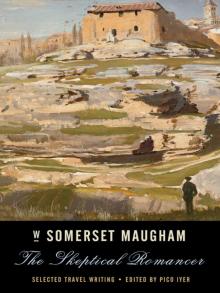 The Skeptical Romancer: Selected Travel Writing
The Skeptical Romancer: Selected Travel Writing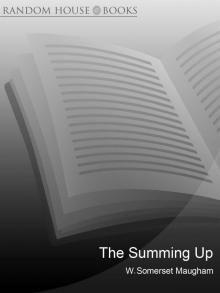 The Summing Up
The Summing Up Up at the Villa
Up at the Villa The Razor's Edge
The Razor's Edge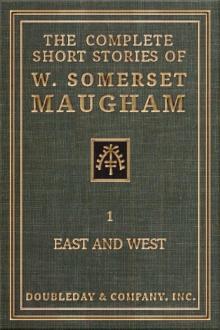 The Complete Short Stories of W. Somerset Maugham: East and West (Vol. 1 of 2))
The Complete Short Stories of W. Somerset Maugham: East and West (Vol. 1 of 2))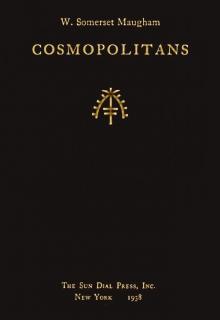 Cosmopolitans
Cosmopolitans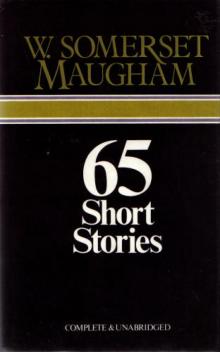 65 Short Stories
65 Short Stories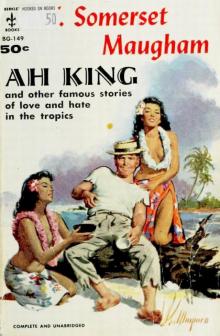 Ah King (Works of W. Somerset Maugham)
Ah King (Works of W. Somerset Maugham)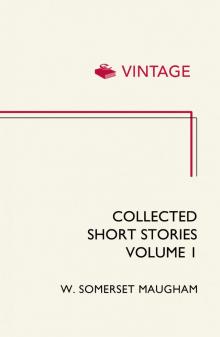 Collected Short Stories: Volume 1
Collected Short Stories: Volume 1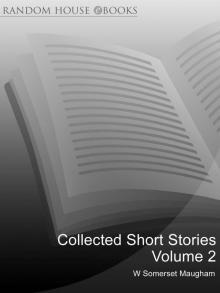 Collected Short Stories Volume 2
Collected Short Stories Volume 2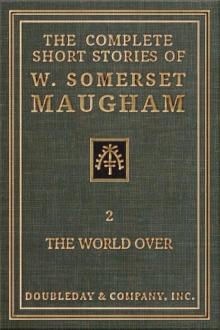 The Complete Short Stories of W. Somerset Maugham - II - The World Over
The Complete Short Stories of W. Somerset Maugham - II - The World Over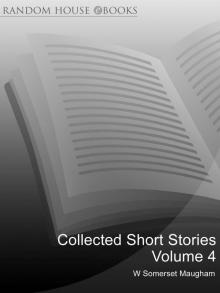 Collected Short Stories Volume 4
Collected Short Stories Volume 4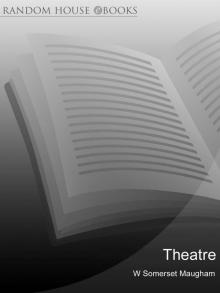 Theatre
Theatre Short Stories
Short Stories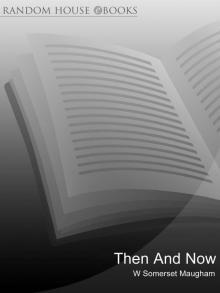 Then and Now
Then and Now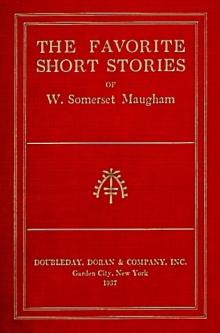 The Favorite Short Stories of W. Somerset Maugham
The Favorite Short Stories of W. Somerset Maugham Of Human Bondage
Of Human Bondage The Magician
The Magician The Great Exotic Novels and Short Stories of Somerset Maugham
The Great Exotic Novels and Short Stories of Somerset Maugham A Writer's Notebook
A Writer's Notebook Christmas Holiday
Christmas Holiday The Making of a Saint
The Making of a Saint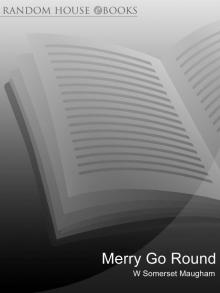 Merry Go Round
Merry Go Round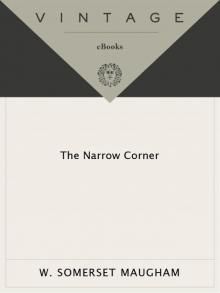 The Narrow Corner
The Narrow Corner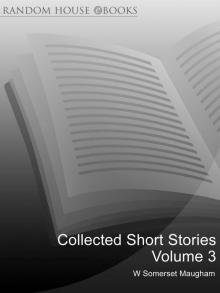 Collected Short Stories Volume 3
Collected Short Stories Volume 3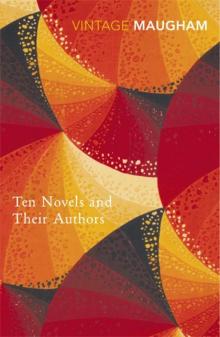 Ten Novels and Their Authors
Ten Novels and Their Authors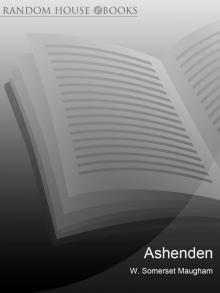 Ashenden
Ashenden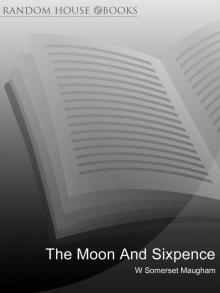 The Moon and Sixpence
The Moon and Sixpence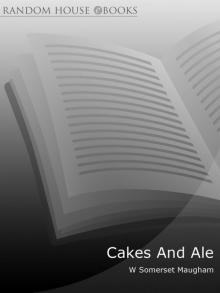 Cakes and Ale
Cakes and Ale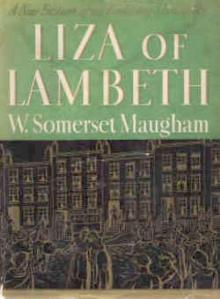 Liza of Lambeth
Liza of Lambeth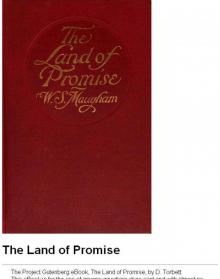 The Land of Promise: A Comedy in Four Acts (1922)
The Land of Promise: A Comedy in Four Acts (1922) A Writer's Notebook (Vintage International)
A Writer's Notebook (Vintage International)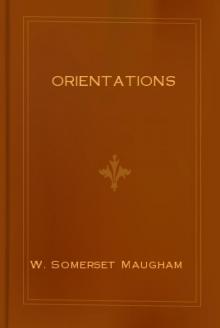 Orientations
Orientations Selected Masterpieces
Selected Masterpieces Mrs Craddock
Mrs Craddock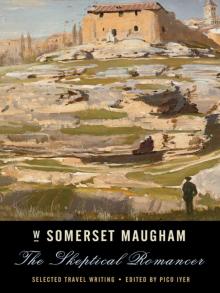 The Skeptical Romancer
The Skeptical Romancer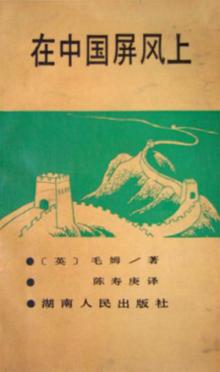 On a Chinese Screen
On a Chinese Screen (1941) Up at the Villa
(1941) Up at the Villa The Great Novels and Short Stories of Somerset Maugham
The Great Novels and Short Stories of Somerset Maugham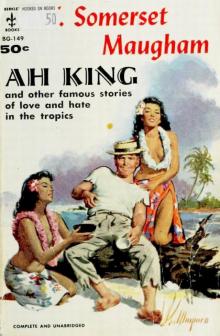 Ah King
Ah King The Explorer
The Explorer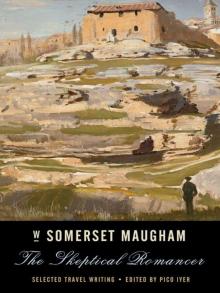 The Skeptical Romancer: Selected Travel Writing (Vintage Departures)
The Skeptical Romancer: Selected Travel Writing (Vintage Departures)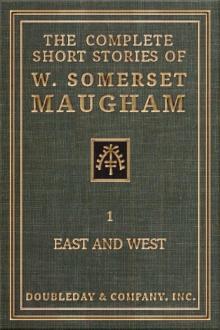 The Complete Short Stories of W. Somerset Maugham - I - East and West
The Complete Short Stories of W. Somerset Maugham - I - East and West